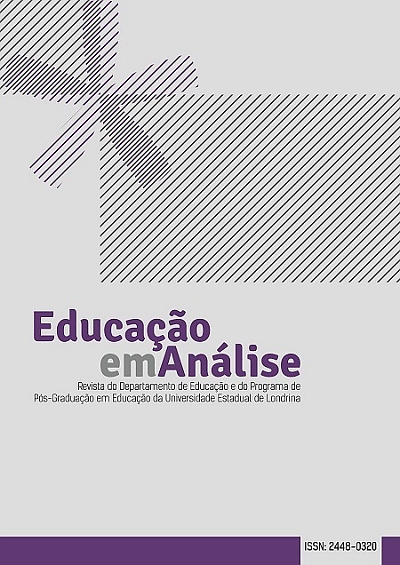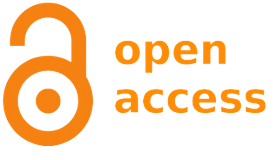The teaching by investigation and the integration of curricular components of science and portuguese language in the pedagogical workshops of elementary school i: a case study
DOI:
https://doi.org/10.5433/1984-7939.2017v2n2p189Keywords:
Integral Education, Science teaching, Teaching of Portuguese Language, Problem-Based Learning, Continuing Formation.Abstract
This study aims to investigate when the research teaching enables the integration of the curricular components of Science and Portuguese Language in the pedagogical workshops in a school of Integral Education. For this, a qualitative research of the case study type was carried out. From a continuing formation course the pedagogical action of a teacher was investigated and the moments that marked the investigative process and the integration of the curricular components of Sciences and Portuguese Language, involving the different languages, were verified. By means of studies based on publications of the National Research Council - NRC (1996, 2000); Carvalho (2013); Campos and Nigro (1999); Azevedo (2004); and Delizoicov, Angotti and Pernambuco (2002), we delineate the teaching of science by investigation with the pedagogical moments, organized in: study of reality, proposition of the problem, hypothesis survey, interactive activities, systematization of knowledge, application of knowledge and presentation of the investigative action. The studies demonstrated that during the action of the teacher with her students of the pedagogical workshops, during the moments of the teaching of sciences by investigation, this integration was being consolidated from the study of reality, being more evident in the systematization of knowledge, until the presentation of the investigative action. In this way, the moments of study of the reality and systematization of knowledge are identified as those in which the integration of the curricular components in the problem-based learning can occur, evidencing an investigative action that can contribute to introduce the student in the different modes of communication and consolidation of learning in different languages.Downloads
References
BOGDAN, R. C.; BIKLEN, S. K. Investigação qualitativa em educação: uma introdução à teoria e aos métodos. Porto: Porto Editora, 1994.
BYBEE, R. W. Teaching science as inquiry. In: MINSTRELL, J.; VAN ZEE, E. H. Inquiring into inquiry learning and teaching in science. Washington: American Association for the Advancement of Science, 2000. p. 20-46.
CAMPOS, M. C. C.; NIGRO, R. G. Didática de ciências: o ensino-aprendizagem como investigação. São Paulo: FTD, 1999.
CAPPECHI, M. C. V. M. Problematização no ensino de ciências. In: CARVALHO, A. M. P. de. (Org.). Ensino de ciências por investigação: condições para implementação em sala de aula. São Paulo: Cengage Learning, 2013. p. 21-39.
CARVALHO, A. M. P. Introduzindo os alunos no universo das ciências. In: WERTHEIN, J.; CUNHA, C. da. (Org.). Ensino de ciências e desenvolvimento: o que pensam os cientistas. 2. ed. Brasília: UNESCO, Instituto Sangari, 2009. p. 71-78. Disponível em: http://unesdoc.unesco.org/images/0018/001859/185928por.pdf. Acesso em: 10 set. 2016.
CARVALHO, A. M. P. O ensino de ciências e a proposição de sequências de ensino investigativas. In: CARVALHO, A. M. P. (Org.). Ensino de ciências por investigação: condições para implementação em sala de aula. São Paulo: Cengage Learning, 2013. p. 1-20.
CAVALIERE, A. M. V. Educação integral: uma nova identidade para a escola brasileira? Educação & Sociedade, Campinas, v. 23, n. 81, p. 247-270, dez. 2002. Disponível em: http://www.scielo.br/pdf/es/v23n81/13940.pdf. Acesso em: 10 set. 2016.
COELHO, L. M. C. C. Brasil e escola pública de tempo integral: Por que não? Revista Proposta, Rio de Janeiro, n. 83, p. 50-55, 1999/2000.
DELIZOICOV, D.; ANGOTTI, J. A. P. Metodologia do ensino de ciências. São Paulo: Cortez, 1990.
DELIZOICOV, D.; ANGOTTI, J. A. P.; PERNAMBUCO, M. M. Ensino de Ciências: fundamentos e métodos. São Paulo: Cortez, 2002.
DUSCHL, R. A.; BYBEE, R. W. Planning and carrying out investigations: an entry to learning and to teacher professional development around NGSS science and engineering practices. International Journal of STEM Education, United Kingdom, v. 1, n. 12, 2014. Disponível em: https://stemeducationjournal.springeropen.com/articles/10.1186/ s40594-014- 0012-6. Acesso em: 20 maio 2017.
IMBERNÓN, F. Formação docente profissional: formar-se para a mudança e a incerteza. 6. ed. São Paulo: Cortez, 2006.
LONDRINA. Prefeitura Municipal. Diretrizes pedagógicas: ampliação de jornada escolar. Londrina: Secretaria Municipal de Educação, 2015. Disponível em: http://www.londrina.pr.gov.br/dados/images/stories/Storage/sec_educacao/amplia cao_jor/dir_ampliacao_15.pdf. Acesso em: 20 jan. 2016.
MARCUSCHI, L. A. Gêneros textuais: definição e funcionalidade. In: BEZERRA, M. A.; DIONISIO, Â. P.; MACHADO, A. R. Gêneros textuais e ensino. 2. ed. Rio de Janeiro: Lucerna, 2002. p. 19-36.
MELLO, S. A. O processo de aquisição da escrita na educação infantil: contribuições de Vygotsky. In: FARIA, A. L. G. de; MELLO, S. A. (Org.). Linguagens infantis: outras formas de leitura. Campinas: Autores associados, 2005. p. 23-40.
NATIONAL RESEARCH COUNCIL. Inquiry and the national science education standards: a guide for teaching and learning. Washington DC: National Academy Press, 2000.
NATIONAL RESEARCH COUNCIL. National science education standards. Washington DC: National Academy Press, 1996.
PADILHA, P. R. Educação integral e currículo intertranscultural. In: MOLL, J. et al. Caminhos da educação integral no Brasil: direito a outros tempos e espaços educativos. Porto Alegre: Penso, 2012. p. 189-206.
PAVIANI, N. M. S.; FONTANA, N. M. Oficinas pedagógicas: relato de uma experiência. Conjectura, v. 14, n. 2, p. 77-88, maio/ago. 2009. Disponível em: http://abenfisio.com.br/wp-content/uploads/2016/05/Oficinas-Pedag% C3%B3gicas.pdf. Acesso em: 18 maio 2016.
RODRIGUES, B. A.; BORGES, A. T. O ensino de ciências por investigação: reconstrução histórica. In: ENCONTRO DE PESQUISA EM ENSINO DE FÍSICA, 11., 2008, Curitiba. Anais... Curitiba, 2008. p. 1-12. Disponível em: . Acesso em: 14 maio 2016.
SANTOS, G. J. F. dos. Produção escolar de textos: parâmetros para um trabalho significativo. 2001. 145 f. Dissertação (Mestrado em Letras) - Universidade Estadual de Londrina, Londrina, 2001.
SASSERON, L. H. Interações discursivas e investigação em sala de aula: o papel do professor. In: CARVALHO, A. M. P. (Org.). Ensino de ciências por investigação: condições para implementação em sala de aula. São Paulo: Cengage Learning, 2013. p. 41-61.
SCHNEUWLY, B.; DOLZ, J. Os gêneros escolares: das práticas de linguagem aos objetos de ensino. In: SCHNEUWLY, B.; DOLZ, J. Gêneros orais e escritos na escola. Campinas: Mercado das Letras, 2004. p. 61-78.
ZOMPERO, A. F.; LABURÚ, C. E. Atividades investigativas para as aulas de ciências: um diálogo com a teoria da aprendizagem significativa. Curitiba: Appris, 2016.
Downloads
Published
How to Cite
Issue
Section
License
Os artigos publicados na Revista Educação em Análise estão sob a Licença Creative Commons Atribuição 4.0 Internacional, garantindo Acesso Aberto. Deste modo, os autores mantêm os direitos autorais de seus trabalhos e, em caso de republicação, solicita-se que indiquem a primeira publicação nesta revista. Essa licença permite que qualquer pessoa leia, baixe, copie e compartilhe o conteúdo, desde que a devida citação seja feita. Além disso, autoriza a redistribuição, adaptação e criação de obras derivadas em qualquer formato ou meio, incluindo uso comercial, desde que a atribuição à revista seja mantida.
A revista se reserva o direito de efetuar, nos originais, alterações de ordem normativa, ortográfica e gramatical, com vistas a manter o padrão culto da língua e a credibilidade do veículo. Respeitará, no entanto, o estilo de escrever dos autores. Alterações, correções ou sugestões de ordem conceitual serão encaminhadas aos autores, quando necessário.
As opiniões emitidas pelos autores dos artigos são de sua exclusiva responsabilidade.









